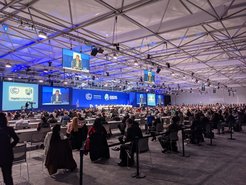Observing for the MPG at the COP26 UN Climate conference - Perspectives, thoughts and personal experiences
The 26th Conference of Parties (COP) of the United Nations Framework Convention on Climate Change convened in Glasgow this November. An integral part of the conference are the many observer organizations that are present. The Max Planck society was also at COP26 with a small delegation: two members of the MPSN, JD and Benjamin, who were able to be part of this delegation. We will share some personal perspectives on COP26 beyond the extensive media coverage.

The most recent United Nations Climate Change Conference, the 26th Conference of Parties (COP26) of the United Nations Framework Convention on Climate Change (UNFCCC), took place in Glasgow from 31 October to 12 November 2021. The Max Planck Society (MPG), as an observing non-governmental research organization, was represented with a small delegation at COP26. JD Rolfes and Benjamin Schiffer, members of the MPSN had the chance to travel to Glasgow in order to participate in the second week of COP26.

With an observer badge at the climate conference, we followed the progress of the negotiations, attended a variety of talks and exchanged on the basic science connected to climate change. Also, we were able to build and strengthen our network with climate activists. The Climate Change Conference is of such a large scale that many events are taking place in parallel at any given moment. Therefore, everyone of the MPG delegation had a very unique COP26 experience and together, as a delegation, we were able to put together our individual experiences to get a broad picture on what is going on at the conference.
MPSN Sustainability Seminar 9 Dec 2021: Observing for the MPG at the COP26 UN Climate conference
After the conclusion of COP26, there were a lot of mixed feelings among the members of the delegation. One of the most notable failures of COP26 is the lack of ambition to reduce emissions as fast as possible so that global warming does not exceed 1.5°C. Also, on the topic of losses and damages, COP26 clearly fell short of what would have been required in order to at least partly restore climate justice for the countries most affected by climate change.
Having said that, COP26 was also a unique focal point for scientists, activists and all other representatives from civil society present in Glasgow. Bringing these people together in person created momentum that could be sensed in the halls of the conference, even though the negotiated outcome document of the conference, called the Glasgow Climate Pact, does not necessarily reflect this. As Thomas Friedman, columnist at the New York Times, wrote about COP26: “For the first time, it felt to me that the adult delegates inside the conference halls were more afraid of the kids outside than they were of one another or the press.” Indeed, the activism of the young generation, at the conference venue and on the streets of Glasgow, as well as all over the world, continues to be paramount in keeping the pressure up on political leaders.
The MPG delegation prepares a joint integrated report for the researchers of the Max Planck Society which will be available shortly.







